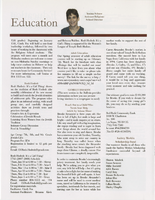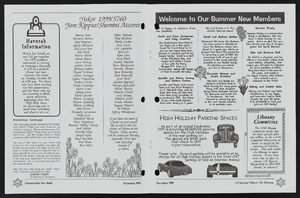Search the Special Collections and Archives Portal
Search Results

Transcript of interview with Michael J. Montandon by Stefani Evans and Claytee D. White, September 22 & October 4, 2016
Date
Archival Collection
Description
Mike Montandon, former Arizonan and former three-term mayor of the City of North Las Vegas (1997-2009), is a natural storyteller. As he recalls municipal governance during a period of record-breaking growth, he talks of forming relationships with developers, legislators, and other municipalities; he speaks to land use, open space, parks, trails, conservation and the Bureau of Land Management (BLM) and Southern Nevada Public Lands Management Act (SNPLMA). He shares histories and stories of the Becker family's role in developing Clark County, of the Combs family's North Las Vegas pig farm; of the drama that routinely characterized BLM land auctions, and of why North Las Vegas spent millions of dollars to build its own sewage treatment plant. The guy who never ran for office in high school or college moved to North Las Vegas in 1992 and four years later was elected as mayor of one of the nation's fastest-growing cities. He ran because he realized the City was populated with people just l
Text

Transcript of interview with Joanna S. Kishner by Barbara Tabach, January 10, 2017
Date
Archival Collection
Description
Joanna Kishner epitomizes the native Southern Nevada who was raised in both a Jewish and secular world of Las Vegas. A daughter of Ellen Neafsey Jobes and Irwin Kishner, she was born in 1964 and graduated from Clark High School in 1982. As she recalls, the halls of Clark High School witnessed a stellar cast of characters in the early 1980s, from future casino executives, to additional judges, to comedian Jimmy Kimmel. Judge Kishner earned a double major in Political Science and Psychology from Claremont McKenna College (1986) and graduated from UCLA School of Law (1989.) She remained in California and worked as senior counsel for Warner Brothers, a division of Time-Warner Entertainment Company and was also an associate with the multi-national firm Paul Hastings Janofsky & Walker. In time, she felt the tug to return to her childhood roots in Las Vegas. She and her husband were married at Temple Beth Sholom, where she had her bat mitzvah and raises her own children in the Jewish tradition. Judge Kishner has been recognized for her legal work throughout the years, this includes pro bono work for disadvantaged children through the Children’s Attorney Project. When she set her sights on becoming a judge, she was joined by her young family as she knocked on thousands of doors to introduce herself and her passion for justice. In 2010, she was elected to Department XXXI of the Eighth Judicial District.
Text

Transcript of interview with Dennis Ortwein by Claytee White, May 6, 2009
Date
Archival Collection
Description
Dennis Ortwein arrived in Las Vegas in 1956. He shares many details about growing up in Montana, his parents and siblings, his education, and the moment in time when he was offered an opportunity to work in Las Vegas. He also lays out the path his singing career took, starting with school plays, duets with his sister, and high school quartets. Once in Las Vegas, Dennis taught for a while, served as principal, and was involved in creating programs that helped integrate schools. He also talks about his church choir work, entertainment in early Las Vegas, above-ground testing at the Nevada Test Site, and anti-nuclear protests. Dennis served as lab school and student teaching coordinator in Nigeria. He offers several anecdotes and stories about the time he and his family spent there. After retiring early (age 53), Dennis acted as consultant to the Esmeralda County school board, executive director for the National Conference of Christians and Jews, and wrote a book. He is currently enjoying his singing career by appearing at conventions, in musicals, and at weddings and memorials.
Text

Transcript of interview with Ron M. Portaro by Stefani Evans and Claytee D. White, July 27, 2017
Date
Archival Collection
Description
Most Las Vegas residents like living in Southern Nevada, but few make the leap of faith that Ron M. Portaro did in 1994. The business and development consultant gave up a "tenure-track, full time, full-benefits, kids-could-go-to-college-for free job" to keep his family in Las Vegas. He had no local job, so he commuted twice a month to the Cleveland and Toledo areas for two years to complete the consulting assignments that fed his young family. As the Ohio native discusses the dysfunctional family into which he was born and was raised, he also talks about forging his own path as an overachiever, about going to college at Penn State at Altoona on a mining engineering co-op program with Morton Salt, working six months out of the year in the salt mines and attending classes the other six months. After transferring to the University of Toledo, he formed his own painting business to pay his tuition and graduated in management in 1978 and earned his JD and MBA in 1981. His mentor at University of Toledo asked him to teach labor management. While teaching labor relations he also began representing athletes as a player agent in the National Football League and the United States Football League back in the day and the Canadian Football League. From there, he became associate director for the Northwest Ohio Center for Labor Management Cooperation at the University of Toledo and later with the Cleveland State Labor Management Center. It was with the latter that he learned the benefits of the BUILT-RITE model of business relations to promote cooperation between and among the building trades, contractors, and owners. In this interview, Portaro speaks to the BUILT-RITE model for cooperation, his 1993 move to Las Vegas and fortuitous meetings of Pastor Paul Goulet of the International Church of Las Vegas, City of Las Vegas councilman Arnie Adamsen, and Charlie Kajkowski of the Las Vegas Public Works Department. He reveals how these connections eventually not only shaped Portaro's life in Southern Nevada; they also enabled him to turn his life experiences, education, and skill set to benefit his church, his family, and his adopted community. The commitment Portaro made in 1994 to remain in Las Vegas has benefitted Southern Nevada tourists, residents, and business owners in countless ways we can appreciate only when we stop to think about how many people had to cooperate and communicate to make our large infrastructure projects come to fruition.
Text

Transcript of interview with Stanley and Sandy Mallin by Barbara Tabach, January 7, 2015
Date
Archival Collection
Description
Stanley Mallin (1923- ) was a native of Kansas City, Missouri; the son of Bess and Louis Mallin. His mother was a homemaker and his father was an industrious immigrant from Ukraine who earned his US citizenship through combat in World War I. Stan was the middle child of their three. It was while Stan attended the University of Missouri that he met Jay Sarno. The two men’s fast personal friendship made them solid business partners. Their first endeavor was in Florida with a tile business. It was during a holiday stay at the Flamingo that the two dreamed a bigger, better hotel-casino. The result was Caesars Palace. He has lived and helped develop Las Vegas since 1968. In 1982, Stan married his wife Sandy (neé Jacoby) Mallin. Sandy grew up in New York and arrived in Las Vegas in 1977. She has provided dynamic leadership in the Jewish community. For several years she was President of the Women’s Division of Jewish Federation. She then followed this as the first woman to be President of T
Text

Transcript of interview with Jackie Boiman by Barbara Tabach, March 27, 2015
Date
Archival Collection
Description
Jackie, n?e Brooks, Boiman was born in Brooklyn and raised in Levittown, New York. Although Jackie recalls her family?s Jewish observance as far less than strict, her religious connection began in the Levittown Jewish Center Sunday School and under the close relationship she had with her grandmother, who kept kosher and inspired her to do so. In her early twenties, Jackie worked in data reduction at Grumman Aerospace Corporation and the space program; was married and had her only child, Andee. After twelve years of marriage, Jackie divorced and relocated to Las Vegas, where her parents had moved earlier. In Las Vegas, job opportunities for a single mother were scant. Then after months of searching, she found her first job as a part time secretary for Temple Beth Sholom. Over the course of the next nearly fifteen years, Jackie would go on to work with almost every congregation and temple in Las Vegas, developing their youth programs and contributing to the growth of each one for 15 years. After a brief retirement, she had gone back to work as the first administration person for Touro University. In this interview, Jackie discusses at length her involvement with each of the temples, her experiences with being a single mother and living below the poverty line. She shares how her life has been changed through trials and tribulations but how her faithfulness and commitment to her mission had led her to the success she has today.
Text

Transcript of interview with Arlene Blut by Barbara Tabach, May 28, 2015
Date
Archival Collection
Description
In this interview, Arlene discusses her family and important friendships; her relations with and impressions of the disparate Las Vegas Jewish communities; the meaningful ways her Jewish relationships in Duluth, Winnipeg, and Las Vegas intertwine; her theatrical, professional, and philanthropic work; the reasons she and Jerry became active Zionists; and their support for Israeli causes. Her liberal sprinkling of Yiddish terms enriches her speech as it exemplifies her deep cultural attachment to and identification with her Jewish heritage, despite the fact that her wide and diverse circle of friends remains predominantly non-Jewish.
Actor, director, friend, mother, producer, wife, and volunteer extraordinaire Arlene Piekoff (now Blut) arrived in Las Vegas in 1971 with two young children and husband, Michael Peikoff, who was opening a surgical practice. Arlene was born and raised in Duluth, Minnesota, where she attended a Conservative Jewish temple but had mostly non-Jewish friends. She met Michael at the University of Minnesota, and they married before he began medical school in Winnipeg, Manitoba, Canada. Arlene and Michael followed his residencies and fellowships to California, Michigan, and Manitoba before they came to Las Vegas Through her brother in law and Ayn Rand?s intellectual heir, Leonard Peikoff, Arlene was exposed to Ayn Rand Objectivism, a philosophy that still influences her political outlook. After her 1975 divorce she began working at the Jockey Club; founded the Meadows Playhouse, Las Vegas?s first professional black box theater; and started Renta Yenta, the valley?s first full-service event planning business. In 1980 she married tax attorney Jerry Blut in a Renta-Yenta-produced, Fiddler-on-the-Roof-themed wedding at Paul Anka's Jubilation Restaurant.
Text

Transcript of interview with Jerry Engel by Barbara Tabach, March 1, 2016
Date
Archival Collection
Description
Jerry Engel was born in 1930 in New Jersey and spent most of his early life in Long Beach, New York until the family moved westward to Las Angeles. Jerry is a retired Certified Public Accountant and loves to talk about the history of Las Vegas that he observed since arriving in 1953. That was the year that he moved to Las Vegas to join his older brothers, Morris and Phil, in their accounting firm. Their major client at the time was Desert Inn. Another personal connection with local history: the Engel brothers? mother, Esther Katz Engel, was among the early investors in the Moulin Rouge hotel/casino enterprise. Jerry graduated with honors from University of California, Los Angeles in 1951. His accounting career in Las Vegas is highly regarded and he continues to maintain a consulting practice. He remains active within the community and enjoys doing presentations based on his memories of Las Vegas history. Within this interview, Jerry highlights people, casinos and other observations of local history that he came into contact with over the decades. He provides insights about the role of an accountant in the gaming industry. He also discusses the influence of Jewish business leaders in and array of local gaming and non-gaming issues, including the retail world, Jim Crow era segregation, and the astonishing growth of the valley over six decades.
Text


